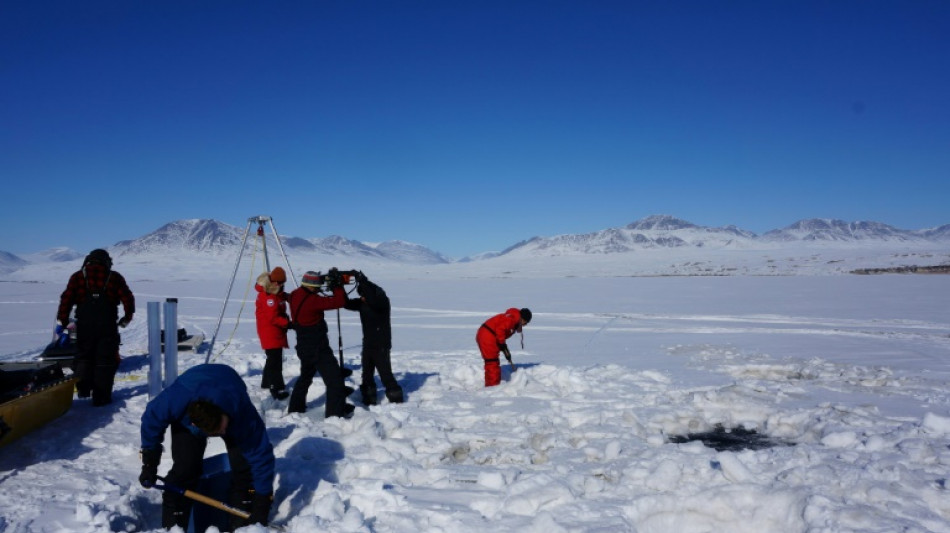
-
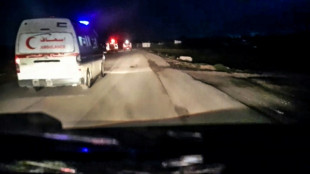 Gaza civil defence describes medic killings as 'summary executions'
Gaza civil defence describes medic killings as 'summary executions'
-
Francis: radical leader who broke the papal mould
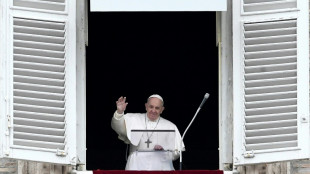
-
 Oscar stars, Max keeps mum, Sainz alive - Saudi GP talking points
Oscar stars, Max keeps mum, Sainz alive - Saudi GP talking points
-
Iyer, Kishan win back India contracts as Pant's deal upgraded

-
 Vance lands in India for tough talks on trade
Vance lands in India for tough talks on trade
-
Inside South Africa's wildlife CSI school helping to catch poachers
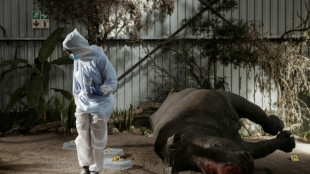
-
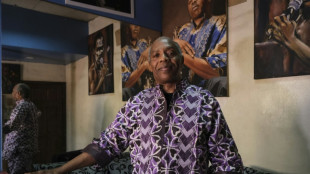 Nigerian Afrobeat legend Femi Kuti takes a look inward
Nigerian Afrobeat legend Femi Kuti takes a look inward
-
Kim Kardashian: From sex tape to Oval Office via TV and Instagram

-
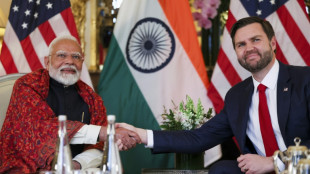 Vance in India for tough talks on trade
Vance in India for tough talks on trade
-
Thunder crush Grizzlies as Celtics, Cavs and Warriors win

-
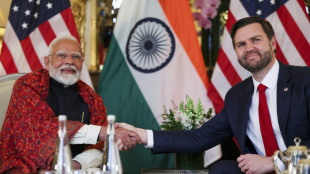 Vance heads to India for tough talks on trade
Vance heads to India for tough talks on trade
-
China slams 'appeasement' of US as nations rush to secure trade deals
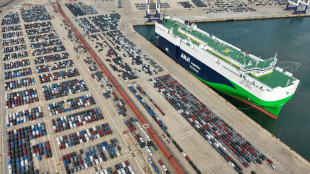
-
 'Grandpa robbers' go on trial for Kardashian heist in Paris
'Grandpa robbers' go on trial for Kardashian heist in Paris
-
Swede Lindblad gets first win in just third LPGA start

-
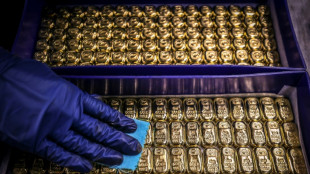 Gold hits record, dollar drops as tariff fears dampen sentiment
Gold hits record, dollar drops as tariff fears dampen sentiment
-
As Dalai Lama approaches 90, Tibetans weigh future

-
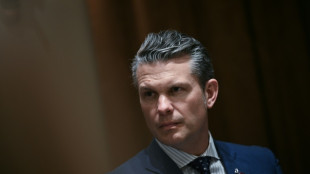 US defense chief shared sensitive information in second Signal chat: US media
US defense chief shared sensitive information in second Signal chat: US media
-
Swede Lingblad gets first win in just third LPGA start

-
 South Korea ex-president back in court for criminal trial
South Korea ex-president back in court for criminal trial
-
Thunder crush Grizzlies, Celtics and Cavs open NBA playoffs with wins

-
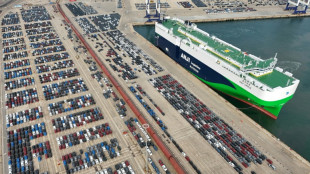 Beijing slams 'appeasement' of US in trade deals that hurt China
Beijing slams 'appeasement' of US in trade deals that hurt China
-
Trump in his own words: 100 days of quotes

-
 Padres say slugger Arraez 'stable' after scary collision
Padres say slugger Arraez 'stable' after scary collision
-
Trump tariffs stunt US toy imports as sellers play for time
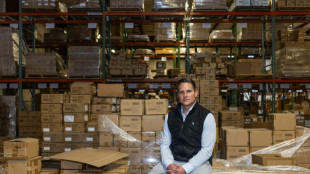
-
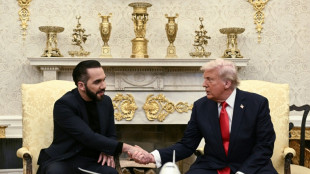 El Salvador offers to swap US deportees with Venezuela
El Salvador offers to swap US deportees with Venezuela
-
Higgo holds on for win after Dahmen's late collapse

-
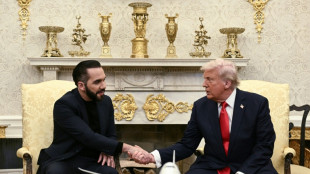 El Salvador's president proposes prisoner exchange with Venezuela
El Salvador's president proposes prisoner exchange with Venezuela
-
Gilgeous-Alexander, Jokic, Antetokounmpo named NBA MVP finalists

-
 Thomas ends long wait with playoff win over Novak
Thomas ends long wait with playoff win over Novak
-
Thunder rumble to record win over Grizzlies, Celtics top Magic in NBA playoff openers

-
 Linesman hit by projectile as Saint-Etienne edge toward safety
Linesman hit by projectile as Saint-Etienne edge toward safety
-
Mallia guides Toulouse to Top 14 win over Stade Francais

-
 Israel cancels visas for French lawmakers
Israel cancels visas for French lawmakers
-
Russia and Ukraine trade blame over Easter truce, as Trump predicts 'deal'

-
 Valverde stunner saves Real Madrid title hopes against Bilbao
Valverde stunner saves Real Madrid title hopes against Bilbao
-
Ligue 1 derby interrupted after assistant referee hit by projectile

-
 Leclerc bags Ferrari first podium of the year
Leclerc bags Ferrari first podium of the year
-
Afro-Brazilian carnival celebrates cultural kinship in Lagos

-
 Ligue 1 derby halted after assistant referee hit by projectile
Ligue 1 derby halted after assistant referee hit by projectile
-
Thunder rumble with record win over Memphis in playoff opener

-
 Leverkusen held at Pauli to put Bayern on cusp of title
Leverkusen held at Pauli to put Bayern on cusp of title
-
Israel says Gaza medics' killing a 'mistake,' to dismiss commander

-
 Piastri power rules in Saudi as Max pays the penalty
Piastri power rules in Saudi as Max pays the penalty
-
Leaders Inter level with Napoli after falling to late Orsolini stunner at Bologna

-
 David rediscovers teeth as Chevalier loses some in nervy Lille win
David rediscovers teeth as Chevalier loses some in nervy Lille win
-
Piastri wins Saudi Arabian Grand Prix, Verstappen second

-
 Kohli, Rohit star as Bengaluru and Mumbai win in IPL
Kohli, Rohit star as Bengaluru and Mumbai win in IPL
-
Guirassy helps Dortmund past Gladbach, putting top-four in sight

-
 Alexander-Arnold lauds 'special' Liverpool moments
Alexander-Arnold lauds 'special' Liverpool moments
-
Pina strikes twice as Barca rout Chelsea in Champions League semi


Climate change may boost Arctic 'virus spillover' risk
A warming climate could bring viruses in the Arctic into contact with new environments and hosts, increasing the risk of "viral spillover", according to research published Wednesday.
Viruses need hosts like humans, animals, plants or fungi to replicate and spread, and occasionally they can jump to a new one that lacks immunity, as seen during the Covid-19 pandemic.
Scientists in Canada wanted to investigate how climate change might affect spillover risk by examining samples from the Arctic landscape of Lake Hazen.
It is the largest lake in the world entirely north of the Arctic Circle, and "was truly unlike any other place I've been", researcher Graham Colby, now a medical student at University of Toronto, told AFP.
The team sampled soil that becomes a riverbed for melted glacier water in the summer, as well as the lakebed itself -- which required clearing snow and drilling through two metres of ice, even in May when the research was carried out.
They used ropes and a snowmobile to lift the lake sediment through almost 300 metres (980 feet) of water, and samples were then sequenced for DNA and RNA, the genetic blueprints and messengers of life.
"This enabled us to know what viruses are in a given environment, and what potential hosts are also present," said Stephane Aris-Brosou, an associate professor in the University of Ottawa's biology department, who led the work.
But to find out how likely they were to jump hosts, the team needed to examine the equivalent of each virus and host's family tree.
"Basically what we tried to do is measure how similar these trees are," said Audree Lemieux, first author of the research.
Similar genealogies suggest a virus has evolved along with its host, but differences suggest spillover.
And if a virus has jumped hosts once, it is more likely to do so again.
- 'Very unpredictable' -
The analysis found pronounced differences between viruses and hosts in the lakebed, "which is directly correlated to the risk of spillover," said Aris-Brosou.
The difference was less stark in the riverbeds, which the researchers theorise is because water erodes the topsoil, removing organisms and limiting interactions between viruses and potential new hosts.
Those instead wash into the lake, which has seen "dramatic change" in recent years, the study says, as increased water from melting glaciers deposits more sediment.
"That's going to bring together hosts and viruses that would not normally encounter each other," Lemieux said.
The authors of the research, published in the Proceedings of the Royal Society B: Biological Sciences journal, caution they are neither forecasting an actual spillover nor a pandemic.
"The likelihood of dramatic events remains very low," Lemieux said.
They also warn more work is needed to clarify how big the difference between viruses and hosts needs to be to create serious spillover risk.
But they argue that warming weather could increase risks further if new potential hosts move into previously inhospitable regions.
"It could be anything from ticks to mosquitoes to certain animals, to bacteria and viruses themselves," said Lemieux.
"It's really unpredictable... and the effect of spillover itself is very unpredictable, it can range from benign to an actual pandemic."
The team wants more research and surveillance work in the region to understand the risks.
"Obviously we've seen in the past two years what the effects of spillover can be," said Lemieux.
O.Krause--BTB




